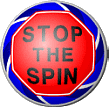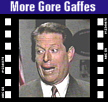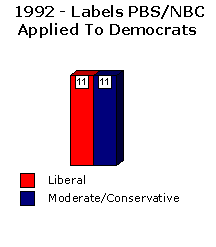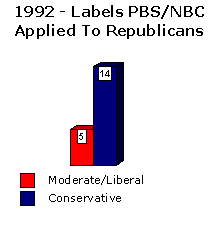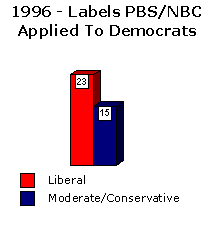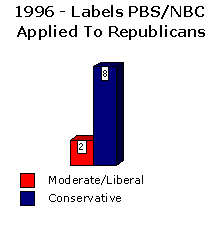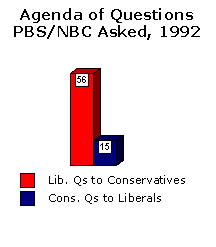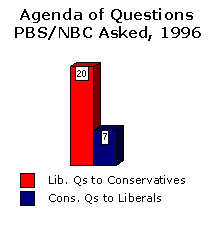|
|||||||||||||||||||||||||||||||||
|
|
|||||||
 |
||||||||||||||||||||||||
|
||||||||||||||||||||||||
 |
||||||
|
||||||
 |
||||||||||||||||||
|
||||||||||||||||||
 |
||||||||||||
|
 |
||||||||||||||||||||||||
|
||||||||||||||||||||||||
 |
|||||||||||||||
|
|||||||||||||||
|
PBS/NBC News Labeling and Questions At Republican and Democratic National Conventions, 1988-1996 Use of Labeling George Washington University Professor William C. Adams conducted the first exhaustive examination of the networks’ prime time convention coverage in 1984. The findings? Unequal treatment of the Democratic and Republican National Conventions by network anchors and correspondents. In his landmark study, Prof. Adams found that correspondents cast Republicans as ideologues by frequently labeling them "conservative" or "right-wing" while almost never labeling Democrats as "liberal" or "left-wing." Since 1988, analysts at the Media Research Center have applied Prof. Adams’s methodology to broadcast and cable convention coverage, including PBS coverage. The numbers below demonstrate that since PBS and NBC News began joint convention coverage in 1992, PBS/NBC has failed to apply ideological labels in a fair and balanced manner. Overall (1992 and 1996), while PBS/NBC was almost equally likely to apply "conservative" and "liberal" labels (applying the "conservative" label to Republicans twenty-two times and the "liberal" label to Democrats thirty-four times), PBS/NBC anchors and correspondents were more than three times as likely to tag Democrats with the "moderate" label (twenty-six times) as Republicans (only seven times). (Read the quotes.)
Agenda of Questions Balanced reporting requires that correspondents periodically don Devil’s advocate hats. One of the most efficient ways of doing this is to pose challenging questions to interviewees — conservative/Republican-agenda questions to Democrats, and liberal/Democratic-agenda questions to Republicans. The numbers below show that PBS/NBC’s performance in this area is shockingly poor. In fact, over the past two conventions, combined data show PBS/NBC anchors and correspondents posed more than three times as many of these challenging questions to Republicans as they did to Democrats. The totals: PBS/NBC asked seventy-six liberal/Democratic-agenda questions of Republicans, compared to only twenty-two conservative/Republican-agenda questions of Democrats. (Read the quotes.)
PBS/NBC's Use of Labels: The Numbers
PBS/NBC's Use of Labels: The Quotes Labeling Delegates Tom Brokaw intones, "[f]or all the efforts to make this a moderate to conservative Democratic Party, we have talked to a lot of those people out there on the floor and we have found that they are much more liberal delegates than they’d like you to believe." (7/13/92) Andrea Mitchell described the tone of the Republican convention as "harsh conservative." (8/20/92) Margaret Warner asks Newt Gingrich: "The Dole campaign officials do say that partly this convention is designed to undo the damage done to the Republican image by you and the Republican Congress, which fairly or unfairly the voters seem to see as extreme, you’ve heard all the words. Do you think that’s true and does it make you feel repudiated at all?" (8/12/96) Labeling Platforms John Chancellor pushes the Democratic party line that Bill Clinton is moving the party "to the center." (7/16/92) Tom Brokaw describes the Republican platform as "very conservative" and "more to the right." (8/17/92) Labeling Parties Jim Lehrer helpfully asks, "[t]his Democratic Party has become moderate, don’t you agree?" (7/14/92) John Chancellor describes those who agree with Bush’s environmental policy as "pro-business conservatives." (8/18/92) Labeling Candidates Jim Lehrer casts both Clinton and Gore as "moderate." (7/16/92) Mark Shields trumpets Clinton’s "run for the middle": "Bill Clinton has another great advantage that Bob Dole didn’t have....Bill Clinton, because of the fact, as we’ve discussed in the past, is unchallenged and has been unchallenged for renomination within his own party... for the last 12 months he has been able to run for the middle, so there is no faction of the party that he has to spend any time, effort, or energy this week really mollifying." (8/26/96) Andrea Mitchell characterizes Republican candidates as "very conservative." (8/17/92)
PBS/NBC's Questions: The Numbers
PBS/NBC's Questions: The Quotes Liberal/Democratic-Agenda Questions to Republicans Maria Shriver, in her question to rape victim Jan Licence following her speech on victim’s rights at Republican convention, exploits the so-called "gender gap" by expressing incredulity that Republicans would care about Ms. Licence’s experience: "But why [speak out] at a Republican convention? So many people have said that they don’t think this ticket, or perhaps this party, is supportive of women’s issues. Why make this stand here?" (8/13/96) Liberal/Democratic-Agenda Questions to Democrats, Too Elizabeth Farnsworth posits the classic "are-the-liberals-not-liberal-enough" question to White House Deputy Chief of Staff Harold Ickes: "We’re looking tonight at this whole question of who the Democrats are. Did the President turn his back on fundamental Democratic principles when he signed the welfare bill?" (8/26/96) Maria Shriver’s version of the "are-the-liberals-not-liberal-enough" question, posed to Georgia Governor Zell Miller: "But how concerned are you about the divisions, that people would say tension, this isn’t reflective, the Democratic party sold out, it’s a, it’s a Republican party with a different name?" (8/27/96) Maria Shriver’s second variation on the theme, asked of U.S. Representative Maxine Waters: "Maxine, after the L.A. riots, you talked about people needing change, wanting to empower themselves. What specifically should give them a reason to vote for this ticket: two white boys from the South?...Do you feel you have to sell out here?" (7/14/92) Tom Brokaw’s construction of the "are-the-liberals-not-liberal-enough" question, posed to Health and Human Services Secretary Donna Shalala: "If you were a poor single mother in a poor rural state in America, without many resources, and you wanted to go to work, you wanted to do all the right things, but there aren’t many jobs for people who have real skills, wouldn’t you be slightly terrified looking into the next two years?" (8/26/96)
Convention Coverage (by Network): Back to Campaign 2000 Home Page
Home | News Division
| Bozell Columns | CyberAlerts |


